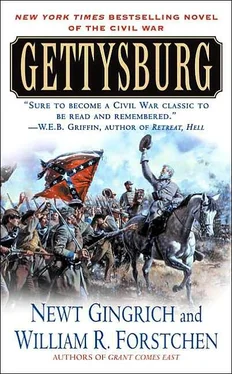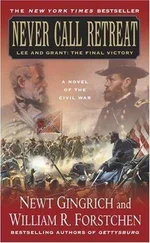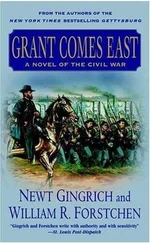Newt Gingrich - Grant Comes East
Здесь есть возможность читать онлайн «Newt Gingrich - Grant Comes East» весь текст электронной книги совершенно бесплатно (целиком полную версию без сокращений). В некоторых случаях можно слушать аудио, скачать через торрент в формате fb2 и присутствует краткое содержание. Жанр: Исторические приключения, на английском языке. Описание произведения, (предисловие) а так же отзывы посетителей доступны на портале библиотеки ЛибКат.
- Название:Grant Comes East
- Автор:
- Жанр:
- Год:неизвестен
- ISBN:нет данных
- Рейтинг книги:3 / 5. Голосов: 1
-
Избранное:Добавить в избранное
- Отзывы:
-
Ваша оценка:
- 60
- 1
- 2
- 3
- 4
- 5
Grant Comes East: краткое содержание, описание и аннотация
Предлагаем к чтению аннотацию, описание, краткое содержание или предисловие (зависит от того, что написал сам автор книги «Grant Comes East»). Если вы не нашли необходимую информацию о книге — напишите в комментариях, мы постараемся отыскать её.
Grant Comes East — читать онлайн бесплатно полную книгу (весь текст) целиком
Ниже представлен текст книги, разбитый по страницам. Система сохранения места последней прочитанной страницы, позволяет с удобством читать онлайн бесплатно книгу «Grant Comes East», без необходимости каждый раз заново искать на чём Вы остановились. Поставьте закладку, и сможете в любой момент перейти на страницу, на которой закончили чтение.
Интервал:
Закладка:
Take Washington, then let Grant come east to that news. With good fortune there would be no fight with him, for the war would already be over.
Lee blew out die candles, left the table, and knelt on the hard, rough plank floor, lowering his head in silent prayer.
"Thy Will be done," he finally whispered and, curling up on the sofa, he drifted into exhausted sleep.
The White House
July 16 1863
It was nearly midnight. President Lincoln stood alone, gazing out of the second-floor office window. The grounds of the executive mansion were a garrison this night, artillery pieces positioned at the four corners, a second battery positioned and unlimbered on Pennsylvania Avenue, along with four companies of regular infantry encamped on the lawn facing Lafayette Square. Stanton had actually wanted the troops to dig in, to build barricades, an indignity to the building and to the position. The president had refused.
Across the street the lights of the Treasury Building were ablaze, couriers riding up with a clatter of hooves, muddy water splashing. Officers came and went, each one with purposeful stride, as if the entire fate of the nation rested upon them this night as indeed it might.
He looked back over his shoulder. John Hay, his twenty-five-year-old secretary, was asleep, curled up on a sofa. The house was quiet. Mary had insisted, earlier in the evening, that at least Tad should be evacuated, and there had been a row. It had dragged on for nearly an hour, her in tears, saying that he didn't care for the well-being of Taddie and was only thinking of what the newspapers would say.
She had finally settled down, calling Taddie in to sleep beside her, and now there was peace.
In part she was right and he knew it, the realization troubling. Every paper would scream a denouncement if he did evacuate his family, ready to point out that while he worried about his own kin, tens of thousands of others had died.
Evacuation was out of the question, and besides, if it ever did come to capture, he knew that Mary and Tad would be treated with the utmost deference by Lee.
An outrageous report had just come to him this morning, that Lee's son, taken prisoner last month, was languishing in a dank cell in Fortress Monroe, nearly dead from his wound. He had sent a sharp reprimand to the commandant, and ordered that the prisoner be slated for immediate exchange as a wounded officer. It was not to curry favor. It was simply the civilized thing to do. He knew Lee would do the same without hesitation.
Strange that the two of us are enemies. I did offer him command of all the Union armies in 1861. A tragedy he turned me down. With his leadership the Union would have been restored quickly and decisively. From the west-facing windows of the White House, he could see Lee's old home, inherited through his wife and now confiscated by the Union, dominating Arlington Heights. Though they were of different backgrounds and social status, he felt an affinity toward the man. He sensed that Lee wished this thing to be ended as well, while across the street there was more than one officer this night who revelled in the power and in the sheer destruction, the opium-like seduction that war could create, the smoke of it seeping into the lungs to control and to poison the mind.
McClellan was like that, so was Hooker, they loved it, the power, the pageantry, the shrill dreams of glory. Perhaps in another age that illusion might have been real, in the time of Henry V, or of Julius Caesar. At least it seemed that way upon the stage and in paintings. But he remembered Antietam, the first battlefield he had ever walked upon, the air thick with the cloying stench of decay wafting up out of shallow graves, soldiers still burning the carcasses of dead horses, the hospital tents overflowing with wounded and hysterical boys struggling before the final fall into oblivion.
He had seen it in the eyes of so many women, young girls, vacant-eyed fathers dressed in black. No longer would the gay tunes of a martial band bring a smile to their faces, only the memory of a son, a husband, a boy who had heard that music and marched off… never to return.
"God, will this ever end?" he whispered.
"Sir?"
It was Hay, stirring, looking up at him, ready to return to his desk to write down another memo, another order.
Lincoln shook his head and made a soothing gesture with long, bony hands, motioning for his loyal secretary to go back to sleep.
He went back over to his desk and sat down, absently sifting through the pile of papers, documents, and newspapers awaiting his attention. The flow was far heavier than usual, a pile awaiting him every morning, and no matter how fast he attempted to clear it, yet more came in throughout the day and night He pushed the papers back, tilted his chair, and rested his long legs up on the desk.
The entreaties from members of Congress, those few still in the city and the rest from around the country, would have to be answered, but that could wait The majority were simply doing the usual posturing for the home press, so they could thump their chests and announce how they had advised the president most carefully on this latest crisis.
The implied threat in more than one letter from Congress was clear. Some were already seeking a way to disenthrall themselves from support of the war, so they could claim all along that they knew the effort to save the Union would be a failure. Others were thundering about who was responsible for the disaster at Union Mills. Several members of the Committee on the Conduct of the War had announced that hearings would be held.
There was even the issue of who was now in command of the Army of the Potomac. Meade was dead; Dan Butterfield had just made it back through the lines this morning, Hancock barely surviving. In his own mind he wondered if that army even still existed or should be quietly disbanded, survivors shifted into other commands. Troops were scattered from Harrisburg to the Chesapeake; the only thing protecting that broken remnant and the cities of the North from Lee was the flooded Susquehanna. Nominally, Couch, who commanded the twenty thousand militia hastily gathered at Harrisburg, controlled the district, but the job was far beyond the capability of a general who had asked to be relieved of field command only two months ago.
Secretary of State Seward was reporting requests from a dozen ambassadors for interviews. Already dispatches were winging to the courts of Europe, with lurid details of the collapse of the Army of the Potomac, and tomorrow more would go out, announcing that the capital was under siege.
How long?
Stanton, puffing and wheezing, had arrived earlier in the evening, announcing that Stuart had been spotted in front of Fort Stevens, and then predicting that rain or not, Lee would strike tomorrow.
He looked back out the window. The steady patter of rain had eased, a damp fog was beginning to roll in from the flooded marshland just below the White House.
If he attacks, will Heintzelman be able to hold?
The general was confident, but then again, nearly all of them showed confidence until the shock of battle hit Still, the positions were strong, the men within them dry, well fed, rested, ammunition in abundance. Though they were inexperienced compared to the battle-hardened men of the old Army of the Potomac, his sense of them was that they would fight. They had endured two years of jibes and, when they came into the city on furlough, even brawls with the men of the field army, who denounced the heavy-artillery units as garrison soldiers afraid of a fight.
Dug in as they were, they'd fight, but there would be precious few reserves, with every fort on a perimeter of thirty miles having to be manned.
He stood and walked back to the window.
Читать дальшеИнтервал:
Закладка:
Похожие книги на «Grant Comes East»
Представляем Вашему вниманию похожие книги на «Grant Comes East» списком для выбора. Мы отобрали схожую по названию и смыслу литературу в надежде предоставить читателям больше вариантов отыскать новые, интересные, ещё непрочитанные произведения.
Обсуждение, отзывы о книге «Grant Comes East» и просто собственные мнения читателей. Оставьте ваши комментарии, напишите, что Вы думаете о произведении, его смысле или главных героях. Укажите что конкретно понравилось, а что нет, и почему Вы так считаете.












